Anyone Protocol: The Dark Horse of the AI Movement

This cycle, we haven't seen much focus or attention on privacy. Back in 2017, privacy was a major topic, with projects like Monero and Verge leading the conversation. Privacy has always been a niche interest, but since crypto largely emerged from cypherpunk ideals, it made sense that it was a dominant narrative at the time.
In the cycles that followed, attention shifted toward new primitives—DeFi, NFTs, Gaming, and now Memecoins. The industry has grown significantly, while the privacy sector has quietly entered a multi-year bear market. The appetite for privacy was replaced by trendier narratives. One key reason for this "bear market" in privacy coins has been increasing regulatory pressure. For example, Monero was delisted from many centralized exchanges (CEXs).
Yet, there are signs that privacy may be on the verge of a comeback. Despite the delistings, Monero quietly outperformed most top 100 coins in 2025. This went largely unnoticed on the X timeline, which remained silent on the topic. Another major bullish signal is the recent announcement from the Ethereum Foundation, revealing plans to integrate zero-knowledge (ZK) proof technology into Ethereum’s base layer. These plans were released just a few days ago.
This is a significant indication that, despite the general lack of attention on privacy, the second-largest crypto project sees it differently. And because we’re still deep in a privacy bear market, this shift is likely not priced in—most people are conditioned to think privacy leads nowhere.
But this is where smart money moves first.
Several privacy projects are quietly gaining traction. One, in particular, is looking beyond on-chain privacy and aiming to transform how privacy is delivered across the entire internet.
Enter: Anyone Protocol.
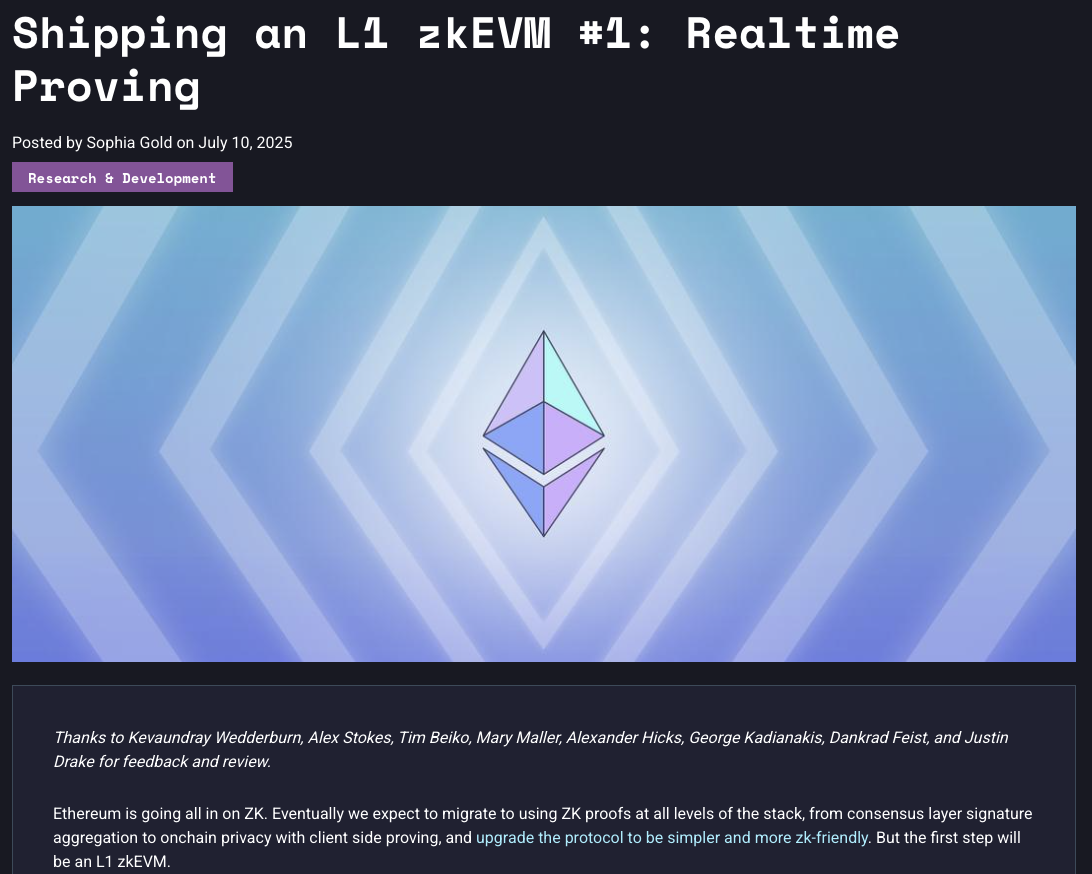
AI's contrarian bet
Anyone is a project designed to protect your data and ensure your privacy online—a challenge that many privacy-focused projects are trying to solve. The internet has a universal privacy problem. What sets Anyone apart is its use of DePIN (Decentralized Physical Infrastructure) hardware to help keep your data truly private.
When you're online, your data is constantly exposed. While a VPN might seem like a quick solution, it still routes your information through a centralized, commercial entity. On the other hand, projects like Grass collect your data and internet bandwidth to sell to AI companies, effectively monetizing your online activity.
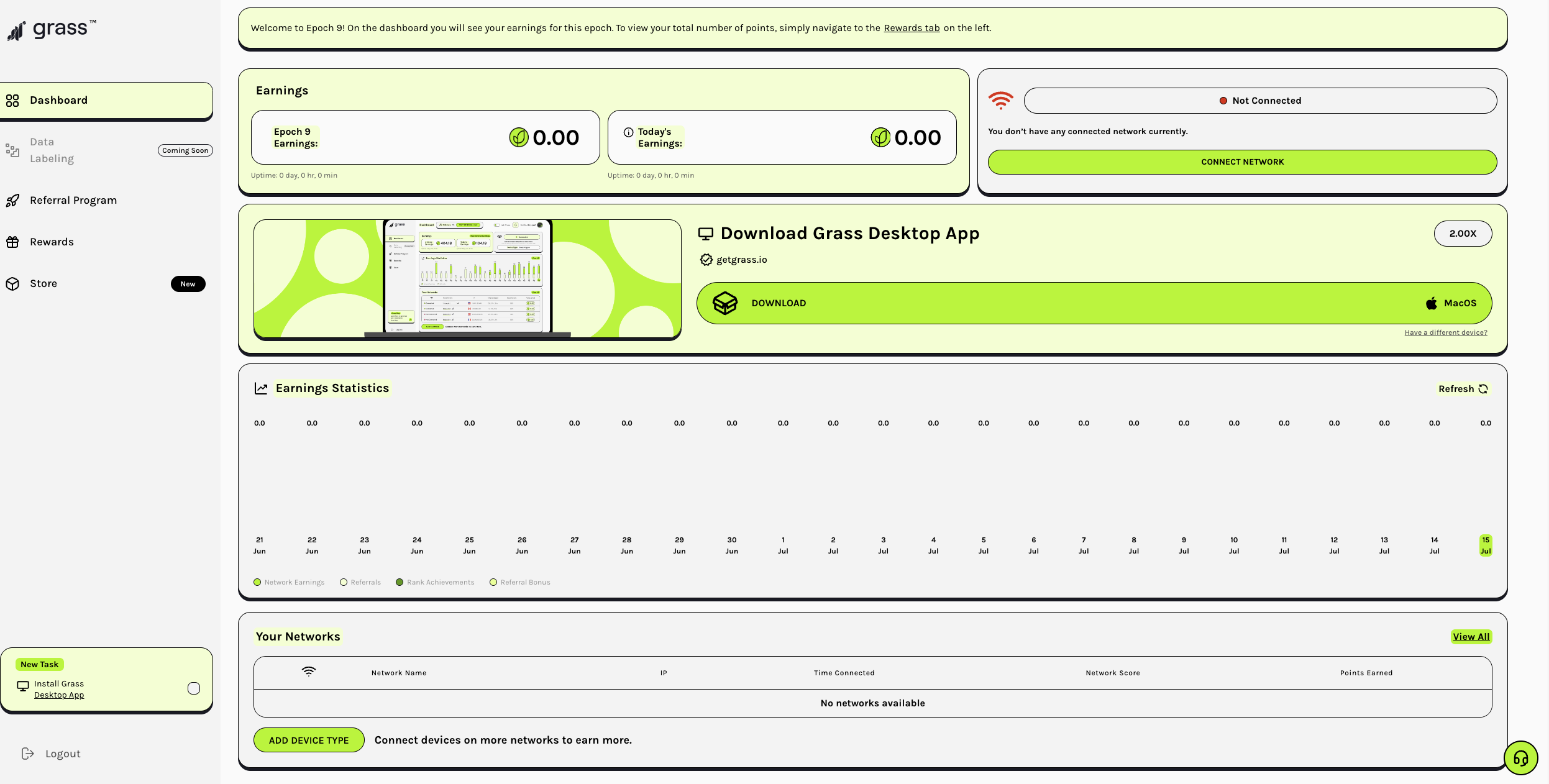
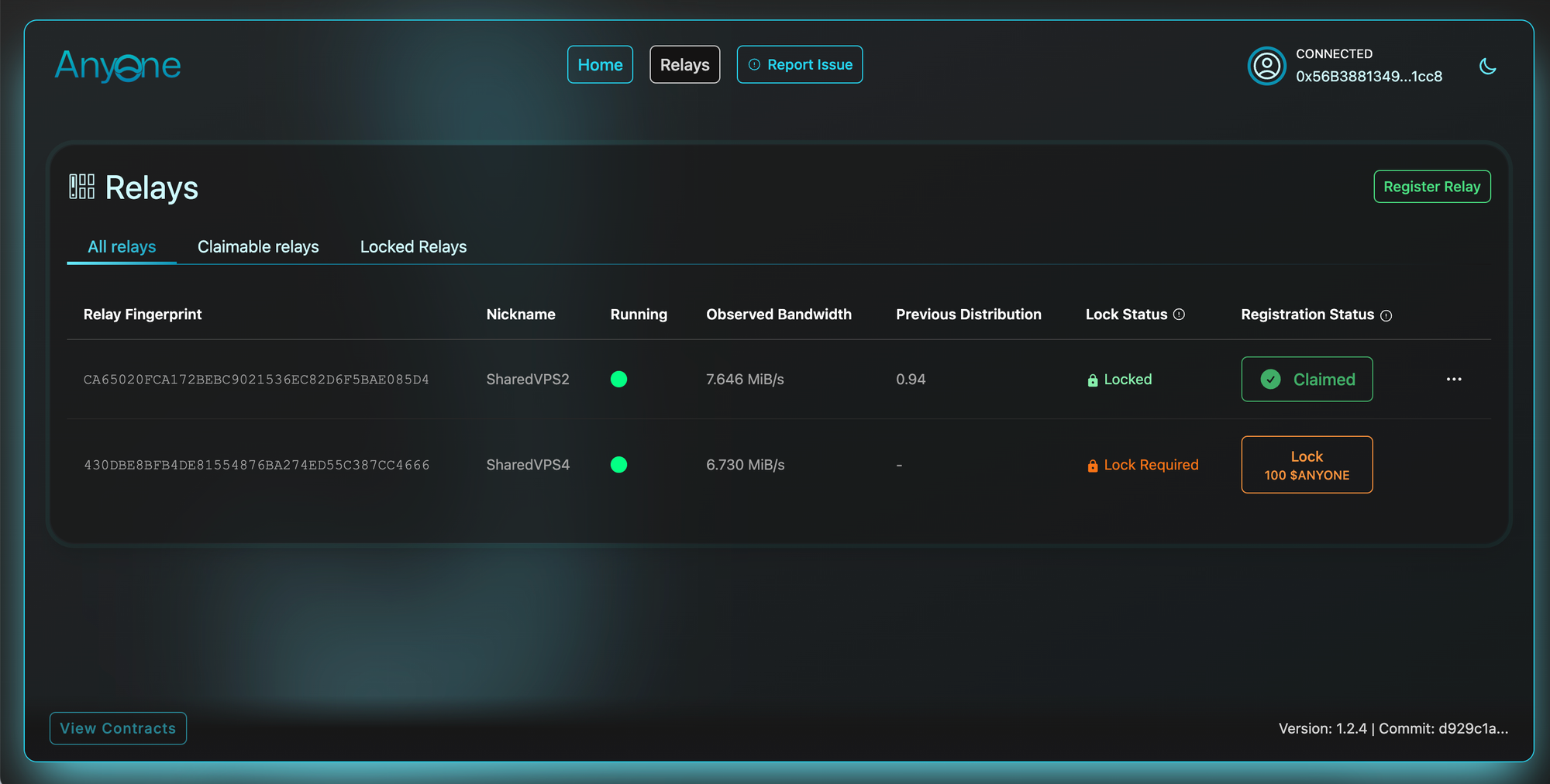
Anyone takes the opposite approach: your data is anonymized, making it inaccessible to AI companies.
There’s a valid argument that many users prioritize monetary rewards over privacy. after all, most of us are in crypto for those incentives. While Anyone doesn’t let you sell your data like Grass does, it introduces a unique rewards system. By contributing your home bandwidth, you can run a node on Anyone Hardware—a DePIN router that can be shipped to you and used to "mine" Anyone tokens.
This mining process is essential because it incentivizes users to provide bandwidth, which helps build a fast and decentralized privacy network. Additional rewards are available in less crowded areas, which helps reduce network congestion: a major issue faced by networks like Tor. In this way, you can earn rewards by supporting a privacy-first infrastructure, without ever exposing your personal data.
For any user or app that integrates Anyone, no AI company will be able to access your information, which is increasingly important. Indeed, Anyone is not separate from the AI narrative - its a direct follow up of it; as AI grows and sees more of our personal data, so does the desire for tools to protect against it. It positions Anyone uniquely as a less-crowded bet on future AI narratives.

Anyone vs Tor
ATOR, the project prior to rebranding as Anyone—began by enhancing the Tor network through token-based incentives. Since the rebrand, Anyone has shifted focus toward building its own decentralized privacy network, complete with a new token, governance system, and a design aimed at mass adoption and ecosystem integration.
Tor remains the most widely used privacy-focused web browser in the world. It’s natural to compare Anyone with Tor, as both utilize onion routing—a multi-layered privacy technology designed to anonymize internet traffic.
Traditionally, protecting privacy online involves combining a VPN with the Tor network. However, this setup is far from ideal, especially when considering mainstream adoption. It’s complex, resource-intensive, and typically only used by technically advanced users.
While Anyone and Tor both rely on onion routing, there are some key differences between the two:
- Protocol layer
- Tor is a web browser: its privacy protections are largely confined to browser-based activity.
- Anyone is a DePin Privacy Protocol: it offers a complete privacy SDK that can be integrated directly into applications and products. For example, ElizaOS uses Anyone as a privacy plugin, demonstrating its flexibility and developer-focused design.
- Bandwith
- Tor network is mostly congested, making it slow
- Anyone is 5x faster than Tor, by incentivising people to run the Anyone Hardware: it allows for more speed than Tor
More notable bullish statistics around Anyone:
- Roughly 10.000 nodes active, from over 80+ countries
- More than 2000 Anyone Hardware sold
- 30.000 daily active clients at peak
- Arweave using the privacy SDK of Anyone, used in ElizaOS
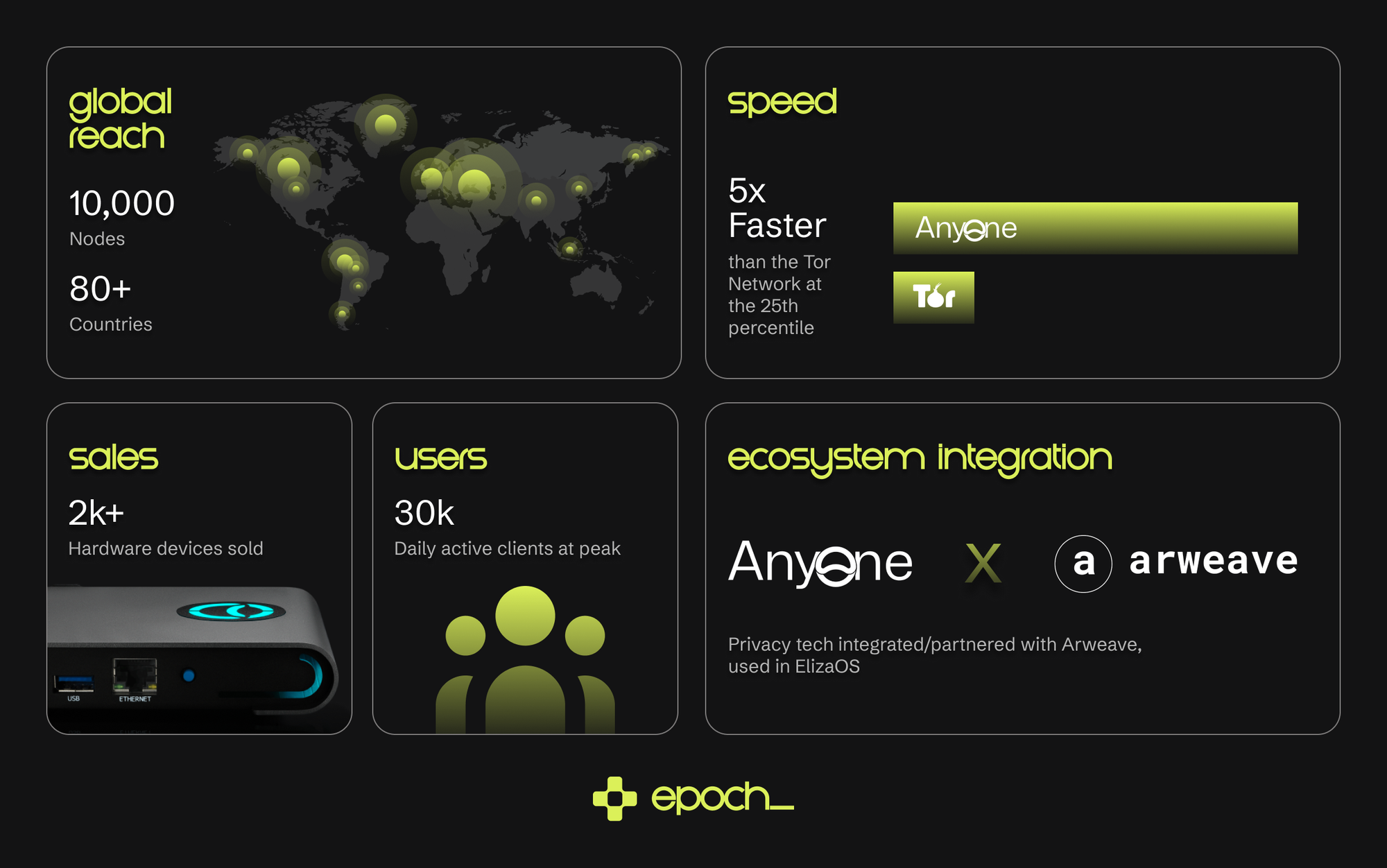
Catalysts
- Delegated Staking
Currently, operators must lock 100 Anyone tokens per relay (excluding hardware relays) to activate the relay and become eligible for rewards. This staking mechanism incentivizes operators to maintain reliable, healthy relays and significantly increases the cost for adversaries attempting to launch repeated malicious or spam relay attacks.
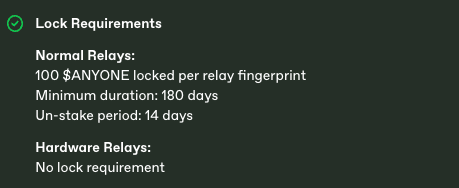
The next major update is Delegated Staking, which will complement the existing operator requirements by allowing token holders to stake any amount of Anyone tokens and earn rewards. Tokens will be staked to relay families: groups of relays controlled by a single entity (i.e., one wallet managing multiple relays). Users can choose to stake to their own relay family or delegate their stake to a trusted operator.
Importantly, this update will eliminate stake lockups and the 14-day unstaking period. Staking will become fully flexible, lowering the barrier to entry for those who want to help secure the network and earn rewards. This increased staking activity is also expected to reduce the circulating supply of Anyone tokens, contributing to stronger tokenomics.
- Unique VPN apps launching (powered by Anyone)
Another key catalyst is the upcoming launch of custom VPN desktop applications built on Anyone. These apps will introduce privacy features that go beyond what traditional VPNs offer, giving users full control over how their privacy is handled.
For example:
- If you're using a trading platform where speed is crucial, you can route your traffic through a 1-hop circuit (single-country routing) for low latency.
- For accessing sensitive or censored content, you can switch to a 3-hop circuit using multi-layered Onion routing to maximize privacy and anonymity.
These apps will be customisable, modular, and powered entirely by Anyone’s privacy infrastructure.
Conclusion
While privacy has taken a hit in recent crypto cycles, overshadowed by trends like DeFi, NFTs, and memecoins, the fundamental need for privacy remains as vital as ever. The sector has faced significant challenges, from regulatory crackdowns to exchange delistings, leading to a prolonged bear market. Yet, despite this, key privacy projects such as Monero have demonstrated resilience, quietly outperforming many mainstream tokens.
The recent developments—from Ethereum’s commitment to zero-knowledge proofs to the rise of innovative privacy-focused DePIN projects like Anyone—signal a potential turning point. Unlike earlier solutions that relied heavily on legacy networks like Tor, these new projects are building fresh, decentralized privacy infrastructures that combine anonymity with user incentives and scalability. They are aiming for mainstream adoption, a scope bigger than just crypto users.
Anyone, in particular, offers flexible staking mechanisms, and unique privacy applications that prioritize both user control and network health. By offering a faster, more adaptable alternative to existing privacy solutions and aligning economic incentives with privacy goals, Anyone may well lead the next phase of privacy adoption.
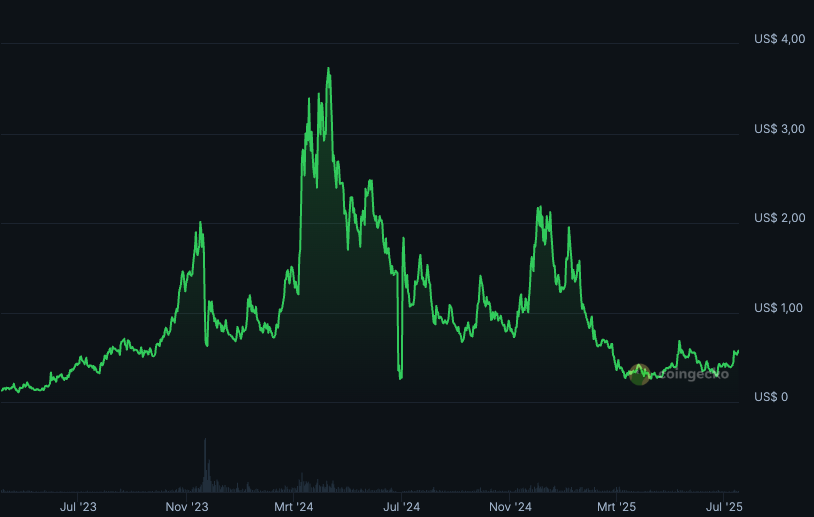
The marketcap is sitting at 55 million FDV at time of writing (61 cents). We are risk on mode for now and Ethereum is stealing the show right now. Historically, Anyone has been outperforming when Ethereum pumped. It's looking like an appealing bet with major catalysts upcoming.
Lastly, the total number of users has peaked at 30,000, and this figure is expected to keep growing as more apps integrate Anyone. This expansion has the potential to significantly increase future revenue. Unlike most Web3 protocols, Anyone’s scope is much broader, it aims to serve the entire internet, including both apps and products.
Anyone Protocol: The Dark Horse of the AI Movement


